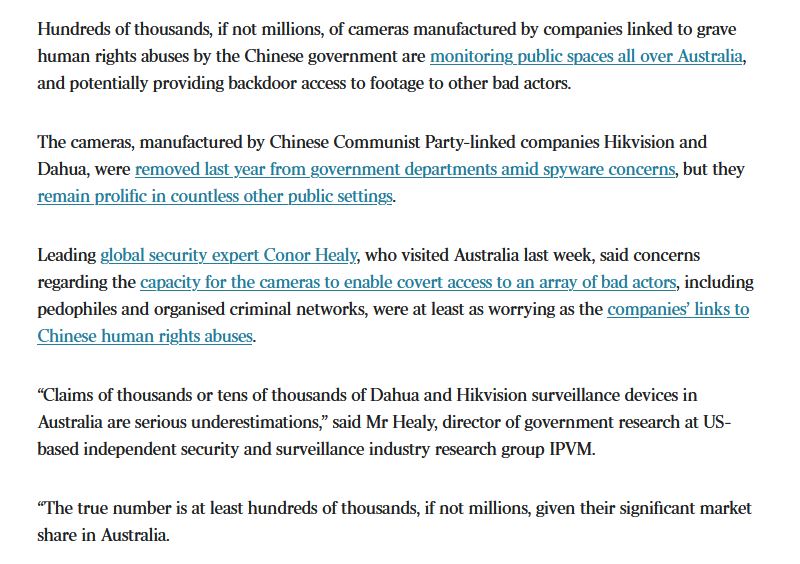Learn why Hikvision, HiWatch, HiLook, Dahua, and many other Australian brands are banned due to national security and cyber security across the world including Australia.
Below in an excerpt from the Australian discussing the cyber concerns with Dahua and Hikvision cameras.

In an era where security technology plays a crucial role in protecting assets and information, understanding the legal and regulatory frameworks governing these technologies is essential. A key piece of legislation in this arena is the US National Defense Authorisation Act (NDAA), specifically sections that pertain to video surveillance, telecommunications services, and equipment. This article delves into what NDAA compliance means, the importance of compliance, the banned chipsets and brands, and how OzSpy, a leading provider of security solutions, navigates this landscape by offering NDAA compliant systems.
As Australia is a defense partner of the US, all Australian government sites comply with the NDAA and use compliant cameras. We suspect this will soon trickle down through local companies that supply to Australian government.
There are many other countries that have banned Hikvision and Dahua systems.
The Risks of Non-NDAA Compliance
Although hard evidence is difficult to obtain, there are several risks openly discussed by cyber experts, government officials, and industry experts regarding non-NDAA compliant systems. These include:
- Backdoor Access: Potential backdoor access to cameras by nefarious governments, criminal networks, and other bad actors.
- Children at Risk: Concerns that children are being recorded by compromised systems, with footage ending up on dark web porn sites.
- Network Vulnerability: Increased risk of penetration to any computer or IoT device on the same network as non-compliant cameras, compromising broader cybersecurity.
- IP Theft: Many companies worldwide are seeing products they have spent years developing, appearing in the Chinese marketplace before they have even launched the products themselves. This is commonly attributed to the backdoors in non-NDAA security systems.
- Banned System: Many countries have banned these systems, even to the point USA made it an offense to sell them. This puts any clients using these systems at risk of ending up with an illegal system if Australia increases the ban from just Government buildings, to the the entire population.
Links showing the Hikvision and Dahua banned status across the world including Australia.
https://en.wikipedia.org/wiki/Hikvision
https://en.wikipedia.org/wiki/Dahua_Technology
The Importance of NDAA Compliance
Compliance with the NDAA is not just a matter of legal necessity; it’s a commitment to maintaining a secure and trustworthy infrastructure. For businesses and government entities, using non-compliant products can result in severe consequences, including the loss of government projects, funding and reputational damage.
Compliance ensures that organisations are not inadvertently supporting practices that could undermine national security.
Banned Chipsets and Brands
The NDAA explicitly bans the use of products and services from specific manufacturers, including but not limited to Huawei Technologies Company, ZTE Corporation, Hytera Communications Corporation, Hangzhou Hikvision Digital Technology Company, and Dahua Technology Company.
These bans are primarily due to concerns over the potential for these companies to facilitate espionage and other security threats. The legislation also extends to any substantial or essential component of any system manufactured by these entities, making it crucial for organisations to scrutinise the origins of their security technology components thoroughly.
OzSpy’s NDAA Compliance
OzSpy, a reputable brand in the security technology sector, stands out for its commitment to NDAA compliance. OzSpy’s dedication to compliance is unwavering, and the brand can supply and install NDAA compliant systems, depending on the specific requirements of their clients. This flexibility ensures that organisations of all sizes and sectors can secure their premises without compromising on legal standards, illegal remote access, or national security.
OzSpy’s approach to NDAA compliance involves a meticulous selection of products and partners. By ensuring that all components used in their security systems are from non-banned sources and comply with NDAA regulations, OzSpy provides peace of mind to its customers. This commitment extends beyond just the products to include a comprehensive service that encompasses consultation, installation, and ongoing support, ensuring that the systems remain compliant over time.
The Value of NDAA Compliant Systems from OzSpy
Choosing NDAA compliant systems from OzSpy offers several key benefits:
- Security Assurance: Knowing that your security system does not contain potentially compromised components from banned manufacturers reduces the risk of unauthorised access and data breaches.
- Legal Compliance: For organisations that are required to adhere to federal laws and regulations, deploying NDAA compliant systems is a necessity. OzSpy’s solutions ensure that your organisation remains on the right side of the law.
- Future-proofing: With the security landscape constantly evolving and regulations continually being updated, investing in compliant systems from a provider like OzSpy means that your security infrastructure is more likely to adapt to future changes without requiring a complete overhaul.
- Expertise and Support: OzSpy’s expertise in NDAA compliant and certified systems means that they can offer tailored solutions that meet the unique needs of each client. Their end-to-end service model ensures that clients receive expert guidance and support throughout the lifecycle of their security system.
Navigating the Landscape of Banned Brands and Their OEM Offshoots
A critical aspect of adhering to NDAA compliance involves understanding the specifics of which brands are banned and recognising their Original Equipment Manufacturer (OEM) offshoots. The NDAA has pinpointed several brands that are directly banned due to concerns over national security and potential espionage. These brands include:
- Huawei Technologies Company: A leading global provider of information and communications technology (ICT) infrastructure and smart devices, flagged for its potential ties to the Chinese government.
- ZTE Corporation: Another major Chinese multinational telecommunications equipment and systems company that has been identified as a security risk.
- Hytera Communications Corporation: Specialises in radio transceiver manufacturing but is banned due to similar national security concerns.
- Hangzhou Hikvision Digital Technology Company: One of the world’s leading suppliers of video surveillance products and solutions, identified for potential security vulnerabilities.
- Dahua Technology Company: A video-centric smart IoT solution and service provider, also banned for national security reasons.
Understanding OEM Offshoots
The challenge extends beyond these brands alone. Many of these companies produce equipment that is then rebranded and sold by other companies, known as OEM (Original Equipment Manufacturer) offshoots. These offshoots can make it difficult for consumers and businesses to recognise when they are purchasing a product that, at its core, originates from a banned company. The NDAA’s restrictions apply not just to the primary brands but also to any subsidiary, affiliate, or product that uses components from these companies.
For organisations looking to ensure compliance, it’s crucial to conduct thorough due diligence on the origins of their security technology. This includes vetting suppliers and manufacturers to ensure that none of the components or technologies employed in their security systems are sourced from these banned entities or their offshoots.
OzSpy’s Approach to Compliance Amidst Banned Brands
OzSpy takes the complexities of navigating banned brands and their OEM offshoots seriously. Their approach includes:
- Rigorous Vetting Process: OzSpy employs a rigorous vetting process to ensure that none of the products they supply and install are sourced from banned brands or their OEM offshoots. This process involves continuous monitoring of supply chains to identify and mitigate any risks of non-compliance.
- Transparency with Customers: OzSpy maintains transparency with their customers about the origins of the products they use. This ensures that customers are fully informed about the compliance status of their security systems.
- Collaboration with Trusted Manufacturers: By collaborating exclusively with manufacturers that adhere to NDAA regulations, OzSpy guarantees that their product offerings are compliant with current legislation, thus safeguarding their clients from legal and security risks.
- Constant Update on Compliance Status: The landscape of banned brands and their affiliations can change. OzSpy stays abreast of these changes, updating their compliance strategies accordingly to ensure that their solutions remain compliant with NDAA regulations.
Conclusion
In conclusion, the NDAA’s provisions on video surveillance and telecommunications equipment have significant implications for organisations across various sectors, as well as families, particularly those with children or any person who have sensitive information stored on their computers.
Understanding the restrictions on certain chipsets and brands is crucial in navigating the complex landscape of security technology. OzSpy’s commitment to providing NDAA compliant systems exemplifies the brand’s dedication to security, legality, and customer service.
By choosing an OzSpy branded system for your security needs, you are not just securing your premises; you are also ensuring that your security solutions are in line with national/international standards and regulations, safeguarding your operations and loved ones against both physical and legal vulnerabilities.

